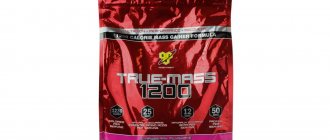A huge number of articles have been published and discussions are ongoing about protein supplements. 97% of them are outright lies. All these articles are written without scientific evidence and without any registered facts. I think here, there are simply fabulous sums involved, and where there are money, there are lies, and it is the authors of such articles who earn their fees.
The bottom line is that protein supplements work. And how can they not work if they are food, only purified. Protein stimulates muscle protein synthesis (MPS).
In other words, protein supplements help fitness enthusiasts increase muscle mass, muscle tone and therefore help in the fat burning process, which is exactly what we need from it! There are many brands of protein powders, a huge selection of protein source supplements to choose from, whey and casein being the most popular. Let’s figure out which one: choose casein or whey protein.
Casein or whey protein?
People often ask, “Which one is better?” What makes a good source of protein? What is not a good source of protein? Discussion on these issues can last indefinitely. I'll try to be brief.
It's like comparing a Ferrari and a tractor. A Ferrari is a fast car, but a tractor is more powerful, just slower. Yes, they are both capable of moving and doing work, but at different speeds. And if you try to take part in races with a tractor and plow a field with a Ferrari... Complete nonsense. As you may have guessed, Tractor is casein, and Ferrari is fast whey protein (hydrolysate or isolate).
When to take which protein
The fast-absorbing nature of whey protein makes it a great option before, during, or after a workout, as it will quickly fuel your muscles with minimal GI stress (unless you have problems digesting milk, otherwise you should definitely avoid dairy proteins).
Casein, on the other hand, is best used before fasting, such as going to bed or a long day filled with many meetings, as the slow release of amino acids promotes a feeling of fullness. You can also add it to meals.
Slow digestion may not be desirable before or after a workout when you're trying to get amino acids in quickly, but when it comes to preventing hunger and catabolism when the goal is to lose fat, it becomes an advantage.
Casein
Casein is a milk protein and makes up almost 80% of all proteins found in cow's milk. Casein protein has a very rich amino acid composition, almost identical to whey, casein is a by-product in cheese making. It has the highest amino acid composition with a high content of BCAA, which are responsible for the synthesis of muscle proteins, or MPS.
Once in the stomach, casein forms a clot, which slows down the rate of digestion, thereby allowing the blood nitrogen balance to be maintained positive for a long time.
In other words... casein at night should become a tradition, a golden rule.
The most common additives are milk casein and calcium caseinate. Micellar casein is considered the most effective. Micellar casein provides a slow release of protein structures, while hydrolyzed and whey casein are fast-acting proteins. This is the top of the protein supplement pyramid.
Casein and Whey Protein Research
The study involved healthy subjects with normal protein intake. After a 10-hour fast, they were given either 30 g of whey protein or 30 g of casein protein.
Leucine levels in the blood peaked an hour after consuming both proteins. However, the whey protein group peaked at a higher level and returned to baseline after four hours. In the group that received casein protein, the maximum was at a lower level, but the original values returned only after seven hours.
Whey protein improved protein synthesis by 68% but had no effect on protein breakdown. Casein reduced protein breakdown by 34%, but did not affect its synthesis.
The study points to the benefits of both proteins, as discussed earlier. Keep in mind that a mixture of protein powders (as opposed to a single protein supplement) will have different absorption rates, which may affect protein synthesis and breakdown.
Based on the information from the above study, one might question the common recommendation to eat every three hours to avoid muscle loss. By taking protein supplements, especially casein, you can maintain elevated amino acid levels longer between meals.
Interestingly, another study concluded that post-workout intake of either type of milk protein resulted in a similar increase (without significant differences) in net muscle protein balance, resulting in net muscle protein synthesis, despite differences in amino acid response patterns in blood.
This means that while it is preferable to take whey protein during training periods and casein during fasting periods, the most important thing is to get enough protein overall, whether from whey protein, casein, plant protein powder or any other protein source.
Amino acids
| Nonessential amino acids | Essential amino acids |
| Alanin | Isoleucine* |
| Arginine | Leucine* |
| Asparagine | Valin* |
| Aspartic acid | Lysine |
| Cysteine | Methionine |
| Glutamine | Phenylalanine |
| Glutamic acid | Histidine |
| Lysine | Threonine |
| Serin | Tryptophan |
| Proline | |
| Tyrosine |
* Branched chain amino acids (essential amino acid)
Take a look at the table above and make sure your protein supplement has both essential amino acids and non-essential amino acids in high quantities. These are the amino acids that will stimulate MPS.
How is whey protein different from casein protein?
The group of so-called fast-acting anabolic proteins includes whey and amino acids. We associate proteins that interfere with the breakdown of substances in the body or are slowly absorbed, in particular with casein .
This classification first appeared in a study conducted by Y. Boirie. The main hypothesis put forward by this scientist was that, like carbohydrates, different types of proteins are absorbed at unequal rates by the body.
Due to the different rates of entry of amino acids into the blood, their physiological effects should be different.
Let us remember that very quickly absorbed sugars provoke a sharp increase in the level of carbohydrates in the blood .
This leads to an abundant release of insulin, which immediately lowers the glycemic , to such an extent that hypoglycemia .
Slowly digested carbohydrates, on the contrary, do not increase either glycemia or the amount of insulin produced. But they serve as a long-term source of energy.
100 minutes after consuming approximately the same amount of protein, those who drank whey had much higher plasma amino acid levels than those who drank casein .
After 300 minutes, the level of amino acids in the “whey” group dropped to the level recorded before taking the drug, while in the “casein” group it remained elevated.
Thus, whey can be classified as a fast-acting protein, and casein as a slow-acting protein.
Due to these differences in the absorption process, whey increases the rate of protein synthesis by 68 percent. Please note: this does not mean that muscle anabolism increases by 68 percent. We are talking about general anabolism, an integral part of which is muscle anabolism.
Since casein is digested more slowly , it has little effect on anabolism (+31%). But it slows down the process of protein breakdown by 34%, while whey has virtually no effect on this aspect.
As a result, whey is viewed as an anabolic protein and casein as an anti-catabolic protein..
The reason for the slow absorption of casein is the formation of sediment in the stomach when interacting with an acidic environment.
The benefit of this precipitate is that the user does not need to take protein frequently, as is the case with whey, to maintain high levels of amino acids in the blood. For the same reason, casein is recommended to be taken in the evening, before going to bed or at night.
Casein also serves as a reliable “protein” link between too infrequent meals. The serum, due to its fast (but, unfortunately, short-term) action, on the contrary, is recommended to be taken in the morning, immediately after waking up or immediately after training.
By the way, Tipton does not seem to support the benefits of whey over casein for immediate post-workout use.
Sedentary men and women took either a placebo, 20 grams of whey , or 20 grams of casein after exercise to develop quadriceps muscles.
When taking proteins, the anabolic response was more pronounced than when taking placebo. In the placebo group, the process of decrease in muscle strength that began during physical activity continued after it ended.
And thanks to proteins, anabolism managed to win.
However, the researchers found no difference between the anabolic response caused by casein and the similar response provoked by whey. Theoretically, whey should be more potent than casein , but conducting such studies in practice faces a double obstacle.
Firstly, the study should take part in untrained people, since anabolism immediately begins in their muscles, unlike the muscles of athletes, who are more resistant to this process. Secondly, exercises for muscle development should not be too heavy. They cannot match the exercises that experienced athletes perform.
These two parameters do not allow us to identify the advantages of one type of protein over others.
https://youtu.be/D_UThC9erzE
However, whey appears to create a more favorable environment for an anabolic response in athletes because it increases leucine faster and more significantly than casein.
When taking whey, insulin levels also increase more significantly than when taking casein.
These two features could provide significant benefits to trained athletes, who find it more difficult to achieve significant improvements in performance than people who lead a sedentary lifestyle.
Although it is believed that casein proteins interfere with the catabolic process , they have not lost their main function, as evidenced by their effect on the cells of the muscle layer .
Milk proteins (ten grams before exercise and the same after exercise) increased satellite cells by 63% over 16 weeks in untrained men doing muscle-building exercises. Taking a placebo during a similar training program did not have any stimulating effect on these muscle cells.
This property of proteins allows users to consolidate the results achieved for a longer period, which cannot be said about a placebo.
Unlike classic proteins found in food, whey and amino acids have the advantage (or disadvantage, as the case may be) of being absorbed very quickly.
But the rapid absorption of whey and amino acids is of interest only to athletes. For people leading a sedentary lifestyle, this property can, on the contrary, cause trouble.
But reasonable intake of these proteins brings benefits to athletes that are hardly possible with the consumption of classic proteins.
Continuing the topic:
what is casein for, casein, casein or whey, which is better, whey protein
Source: https://fitforall.ru/chem-otlichaetsya-syvorotochnyj-protein-ot-kazeinovogo/
Online magazine about choosing the best goods and services
25.06.2019 19:27:52
Expert: Oleg Katsman
When it comes to bodybuilding - and the right, natural way - it is very important to control your diet and eat more protein. After all, it is the “building material” for muscles. If there is not enough protein, even with the most intense workouts, muscles will not grow.
Since there is not enough protein in regular foods, bodybuilders compensate for its lack with sports nutrition. After all, not every person will be able to eat enough food to build several kilograms of “new” muscles. And the sports nutrition market offers a huge number of varieties of protein products aimed at improving muscle shape.
Even protein comes in many forms and varieties. It can be casein, whey, egg, vegetable, or even derived from goat milk. And therefore, choosing the right one can be very difficult.
In this material we will help novice bodybuilders and look at the two most common types of protein sports nutrition - casein and whey protein - what is the difference and what is better.
Comparison
The main difference between whey protein and casein is that one is “fast” and the other is “slow”. The rest is just details.
| Characteristic | Casein | Whey Protein |
| Time to digest | Up to 7 hours | Up to 2 hours |
| Useful action | Inhibition of catabolism, muscle mass gain | Gain muscle mass, strengthen immunity |
| Ideal time for appointment | Before bedtime | Before, after, and in the morning |
Overall, whey protein and casein complement each other. One is taken before bed, the second during the day. However, if you don’t want to bother with calculating BJU and buying a bunch of different cans of sports nutrition, you can completely refuse casein - the damage will not be too significant.
Source: https://expertology.ru/sravnivaem-kazein-ili-syvorotochnyy-protein/
Summarize
- Casein and whey proteins are obtained from milk.
- They differ in digestion time - casein digests slowly, making it good to take before bed, while whey digests quickly and is ideal for training and muscle growth.
- Both contain various bioactive compounds that can boost your immune system and offer other benefits.
- Preferring one over the other won't necessarily give you better results in the gym or noticeably improve your health, so choose the one you prefer or buy a blend that contains both types of protein.
- First of all, remember that your total daily protein intake matters the most.
- While casein and whey have their differences, each of these types of protein plays an important role in your body and provides numerous health benefits.
Tags: Protein
- Related Posts
- Steroids: harm and benefit, application, side effects
- Vitamin B6: properties, uses, where it is found, side effects
- Diamine oxidase (DAO): benefits, dosage and harm
« Previous entry











